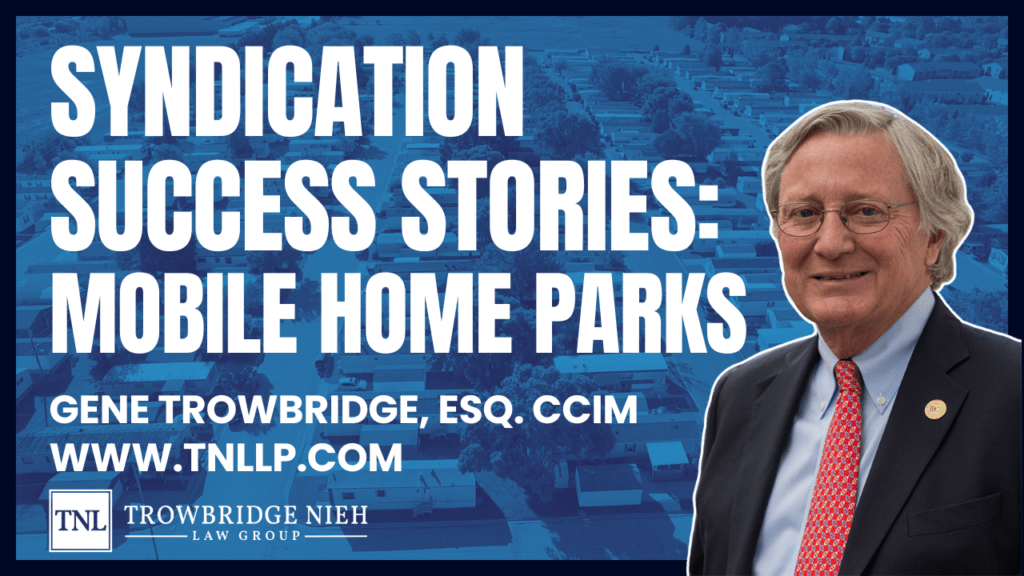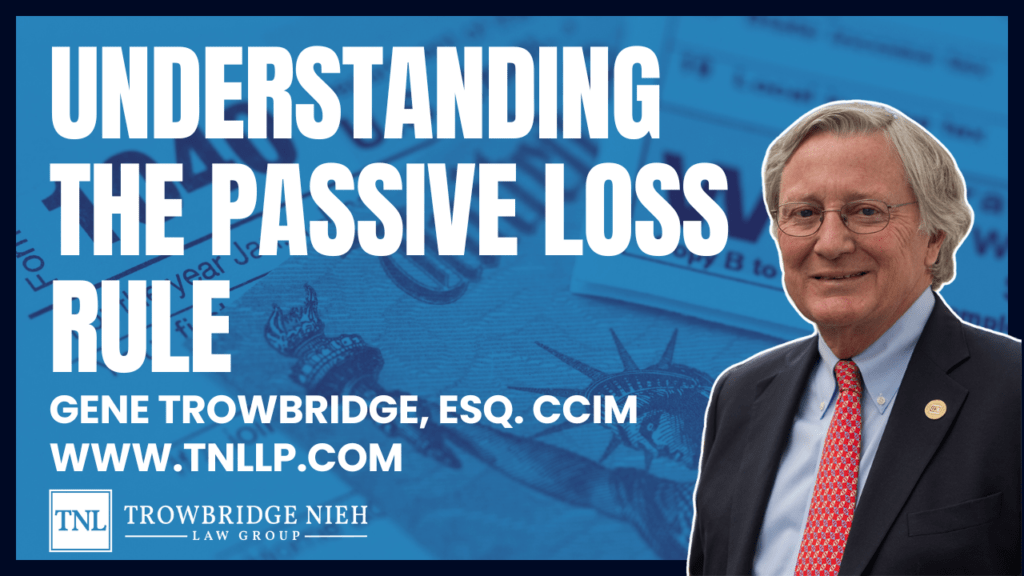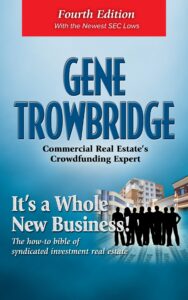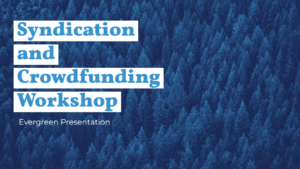Syndicators!!! Don’t make these big mistakes…
In the launch episode of “The TBD with TLG Podcast”, attorneys Gene Trowbridge and Jonathan Nieh discuss some of the biggest mistakes syndicators make when putting together their deal, and how they can avoid them.
Transcript
 | GT | - Well, welcome today. Welcome to the TBD with TLG. This is Gene Trowbridge and I'm here with my partner, Jonathan Nieh. And we're gonna do one of our infamous TBD podcasts. We never know exactly what we're gonna talk about until about a day beforehand. So that's why we come up with TBD to be determined. And today we're gonna talk about mistakes, five mistakes that syndicators make, how's everything in LA with you today, Jonathan. |
        | JN | - Oh, it's awesome. It's a nice and sunny, 80 degrees up here. How about you? You're down in Lake forest. |
         | GT | - Down here, the lake looks nice. A little breeze on the Lake. People are out doing some kayaking today, social distancing. That's a pretty cool and you and I are working. |
        | JN | - We are working virtually. |
         | GT | - We're trying to provide services a little education-based marketing for people who are listening. I'm glad everyone joins us. We do this every Thursday at noon Pacific and let's get right to it. We've got five biggest mistakes and Jonathan and I have kind of, I mean, we've got a list of mistakes. It's a much bigger than that, but in the time a lot of we're gonna come with five that are timely. We see going on right now in Jonathan, take it away. |
        | JN | - All right. So mistake number one, one of the biggest mistakes you can make as a syndicator is drafting your own documents. So for our clients, we draft a bunch of documents. We draft the PPM, the private placement memorandum. We draft operating agreements for your LLCs. So those are the governing documents that control your company. We also draft the subscription booklet and I can kind of understand why someone would wanna draft their own documents. Like hiring us can be expensive. I mean, I think the fee that we charge our clients as well worth it. The services that we perform, but it's not cheap, obviously. So if you wanna save money that's one thing you could do is to draft your own documents, but it's a huge mistake. These are legal documents. These are documents that you're gonna be giving to your investors to read. So you wanna make sure that they're drafted correctly by experienced attorneys. So one of the things that could happen, if you draft your own documents is you can make a mistake in drafting stuff. And what if an investor finds that mistakes? So your investors are gonna read these documents. They might even go to their own attorneys and tell them so their attorney to read it and their attorney is gonna come back and be like, are you sure you wanna invest in this deal? This doesn't look like a good PPM. It looks like someone just found like a template online and put all this stuff together. So that, I mean, that's one thing that might happen is you're not gonna be able to get any investors that wanna invest in your deal because you don't have professional, you don't have professional documents to provide to your investors. Worst case scenario, you screw something up and then years down online, an investor comes back and sues you for mistake you made in the documents. So yeah, big, big no-no. Oh, another point is this is legal work. We are performing legal services for our clients by drafting these documents. If you're doing yourself and you're not a licensed attorney, you could be found to be practicing unlicensed law. So the bar association might even come after you for that. So all the more reason. |
         | GT | - It's important, Jonathan, in Texas, it is a misdemeanor to do the unauthorized practice of law. So you wanna be careful about that. One of the things that I see periodically is I see people cutting and pasting and you mentioned that gonna getting a template or something on the internet, they cut and paste documents. And they take one part from a limited partnership agreement and one part from a corporate bylaw and another part from an LLC. And they put it all together and you've got, you've got a Ragu, you've got a map you've got, so you can't do that. And then you go sit on the stand in a lawsuit against you. And the opposing attorney says something like Mr. Jonathan, don't you agree that the common practices the industry is have a professional and have an attorney draft documents to protect your investors money. And then you're gonna step up and say, well, no, I saved $8,500 by doing it myself. And I thought that was great. And all your investors lost $5 million. They're not gonna care. They're just not gonna care and being a little cynical there. But that is the issue and ensure there's conflicts, that's our business. If it was a great idea for you to, for everyone to go draft your own documents, Jonathan and I would be doing some other type of law but is the law we pick and I've been a syndicator and I know how terribly important every word in the document is. So Jonathan actually does most of the drafting as my partner, one of the two of us can type and we leave a lot of the drafting to Jonathan. And it's very important that the documents are right. So that's a really big mistake. That's a mistake in any market, but what's the next mistake you wanted to talk about, Jonathan? |
        | JN | - So mistake, number two, kind of going along with our documents is not reading your documents. Yeah. I mean, you think it would be self explanatory. We're drafting these documents for you as our client. You would think that one of the first things you do is review them and read them and understand, everything that's going into the documents because you're giving these documents to your investors so that they can review to make the decision to invest in your deal. So you wanna be able to answer any questions that your investors might have. So the only way to do that is to actually read it and understand everything that goes into the PPM and all the different articles and sections of the operating agreement especially that to the operating room that's the governance for your company. That's gonna determine how and when you make distributions, voting, what voting rights your members have, what they can and can't vote on, liquidity, so you know how investors can get their money out in the future, if they want to, all those terms are in the Auburn. And if you're not familiar with that, I mean, that's just gonna look really bad to your investors. So, I mean, it does happen. I understand the documents are super long. So it's like, what was it? A hundred pages total, including the VPN and operating rooms. So, yeah, I mean, it's gonna take a while to read but just sit down for a weekend, grab a beer and just read everything so that when an investor comes to you with a question you can answer it right awa0. |
         | GT | - But what happens, Jonathan? What happens is we get the documents finished. We give them to our client. And as opposed to reading the documents, they wanna rush out and raise the money. People aren't sitting there with checks, ready to give them, they wanna do that. So they don't read the documents. And that is understandable in the heat of the transaction. You don't read them, but you probably have it. Maybe one pet peeve. I'll give you one of mine about not reading the documents. And I don't wanna make a long story out of it but bottom line is people who have money coming out of a 1031 exchange can not invest in an LLC and get tax deferral. You have to buy real estate and investing in an LLC, you're just getting interests in the LLC. And so it's not real estate. That's the question I get the most. And we, I think we have that in our document four times and someone will call and say, I'm five days from closing. I'm $300,000 short, uncle Bob has got 300,000 in exchange. Can I put the money in the deal? Sure. It's just an uncle. Bob, won't get texts fertile. Well, how come? Well, let's open the document. Let's go to page two and let's read it. Okay. So that's my pet peeve. Do you have one you can report that's a pet peeve? |
        | JN | - Yeah. I had one recently. I don't know. I don't know how far into the documents I wanna get into but there are provisions, there are tax provisions. And there's the whole issue with the new audit rules, the new BBA audit rules. I keep getting questions about it. But we have an entire section in the PPM and the operating room about the rules. all you have to do is just read it and you can figure it out. But we have clients that always ask me about it. |
         | GT | - Not that we're not happy to answer. Not that we're not. I mean, I think our fee agreement says that we're gonna answer securities questions for you for six months after the deal. It's not that we wanna do that, but please, please, please. So those are two good questions. You've two big mistakes you've uncovered, Jonathan. My first big mistake is when I see a sponsor digging into their cash reserves to make distributions, their documents says we're gonna make a preferred return of five or 6%. And here comes C end of the quarter and there isn't quite enough money to do that from the operations of the property, the income minus expenses doesn't give us a full 6% to give out but I've got some money sitting over here that's gonna be used to replace the 36 air conditioner units in our complex. So I'll just take some of that money, put it in the bank and then make the distribution and tell the people, here's your 6%, two problems with that. Number one, when it's time to do the air conditioners, you won't have enough money to do the air conditioners. You'll have to explain that to your investors. And they'll say that was stupid. We need those air conditioners done to increase the value of the property. We couldn't have waited a couple months for our check. The first thing they'll tell you and number two, it's fraudulent. You're giving them their money back, a return of their capital. And you're telling them it's the return on their investment. When you send a preferred return or a cash distribution out that's supposed to be from the earnings of your property, it's supposed to be the earnings. Like you go to the bank you've got a hundred thousand dollars in the bank. The bank's gonna pay you some interest, take your interest. That's what you earned. If you take interest and some principal, you didn't earn more, you took some of your money back. So tell the investors exactly what's happening and don't be a fraudulent with them. The next mistake that I see is a liquidity issue. When an investor comes to you, comes to the sponsor and says, I need to sell my interests. I need liquidity. And the first thing that a sponsor might say as well, I'll go and find someone else outside of the unit, outside of the company, to buy your units, using new money from other investors to pay off existing investors While the project is still ongoing is a Ponzi scheme. That'll get you in real trouble. First of all, you can't sell someone else's interest because it's now it's their security and you don't have a securities license. Secondly, you can't sell it to an independent third party to bail them out. on other podcasts. we talk about the issue of liquidity, capital calls and distributions. There's plenty of rules and steps in the operating agreement that you can take to provide liquidity to that investor who needs liquidity? Probably the biggest deal are the two or three steps that we have in there that tell you how other investors inside the company can buy the interest from someone who's already inside the company. It could be the company buying it. It could be the manager it could be the other investors, so do that, don't buy, don't find a new investor to buy that investor out. That doesn't mean that that investor themselves couldn't go to an outside third party and sell their interests. They can do that. And then now that other new person comes into the company, they will get all the economic benefits from the interests. But you as a manager would have the right to decide whether they can have voting rights. So there are ways to do it, but don't get yourself in trouble by trying to be a good person. You're just trying to help this person out. Don't screw things up for yourself and the rest of the company. So those are the two that I brought, the two mistakes I brought to the discussion today. Jonathan, what's your last mistake? |
        | JN | - Thanks Jean. So the last one that we're gonna be talking about is in regards to blind pools. I think this is pretty popular right now. I mean, a lot of people are talking about how right now with COVID and everything doing a blind pool is a good idea because the market's gonna be so great in, six months to a year. There's only so many deals. So why don't we put together a blind pool right now to get ready to do that. But the mistake is if it's your first time doing a syndication, you should definitely not do a blind pool. And the number one reasons for that is it's just, it's so hard to raise money for a blind pool if it's your first time, because one of the first questions that investors ask you is have you done this before? Do you have experience in raising money? If you say, and you obviously have to say no because first time, but you know it's that much harder with a blind pool because you don't have a specific property that you could show your investors to show them, Oh, this is what I'm investing in. You're just asking them to blindly give you their money so that you could go out and acquire some properties that are, you don't even don't even know if you're gonna be able to get into. So yeah, I mean, like some of the best, I can understand some of the other reasons why you would wanna be a blind pool rate. Like if you don't have enough capital for the earnest money deposits, you might want to break some initial capital first so that you can go out and make offers on properties, get them on a contract so that you have the various modes closets. Let us get some other good reasons to do a blind portion. |
         | GT | - I think a good reason to do a blind pool is to diversify by more than one property. I think investors like that, I think that's attractive. Another thing is it is a acquisition strategy. There are a lot of people out there with 1031 money who can go to a seller and say, we can close quickly. They can prove up funds you can't. So if you had the money, you could prove up funds. That's attractive. And I do think it's an acquisition strategy. You can go into a bank and deal with the bank on their troubled properties. You can go to an auction. You can go to the steps of the courthouse and one skin. You can deal with sellers one-on-one, I think that's, I think that's good in our more successful blind pool, clients are house flippers. Someone's done two or 300 house flips on their own and now wants to put together a pool of investors that do another hundred houses. That's type of blind pool that'll probably sell 'cause you've got a track record and you probably have some investors who will come along with you in that opportunity to start with. So my best advice on blind pools is don't do it if you don't have a track record 'cause it's gonna be terrible. It's hard to raise money. Another thing I think is I've seen people wanna do a blind pool but they wanna do it just to buy one property. Well, that's a first of all, a double set. You have to sell people to get their money into the blind pool to start with. And then when you have a property, you'll show them the property and you have to resell them on whether they wanna stay in the deal with that property. And one of the things I've learned from doing blind pools plus I did a lot of them. There's no penalty you can give an investor that will make them stay in the investment. Some people say, well, we'll just raise 10% of the money now. And it'll be non-refundable, that'll give me the money I need to go out and buy a property. And then I get the property, I'll show the people their property and they're not gonna walk away from their 10% sure as hell they are. They don't care. They're not gonna put good money after bad money. So it's just fraught with trouble. And one of the things that I've seen that Jonathan and I have both seen is that if you raise some money for a client pool and you use it for earnest money or you use it for due diligence and the deal falls through, whose money was at risk, were you using investors' money? Were they told that you'd be using their money? And there was a chance that they would lose some of it, or were you using investors' money and you told the investors that if anything happened and we couldn't get our money back and we lost money, I'd make it up to you. So that's something that a smart investor would read in the documents and understand what's going on. And if you don't have a track record, as Jonathan said you're just not gonna be able to raise money. But certainly Jonathan, we have clients who've done 15, 20 transactions and multifamily or mobile home parks. And they're doing blind pools all the time and that works for them. Those are the five biggest mistakes that we put together. And we have a couple more minutes left. I'm gonna ask Jonathan if there's any other things that we didn't cover that he sees, now, that is a mistake before I wrap this up. |
        | JN | - Yeah, I mean, we have a whole list of mistakes. I'll go through them, spend hours here, just talking about, but I mean, a little minor ones, I guess, like going along with drafting of documents, forming your entities. We see that every once in a while where someone will set up their LLC instead of having us set it up or having other attorneys set it up then they'll make a mistake and then you're forming it. So basically I think that's a good one that, you're hiring professionals to you work for you, let them do the work for you. Try not to do like, try not do a lot of self-help stuff. |
         | GT | - That's a good one. And I'm gonna mention too that might very well be topics for some future TBD podcast. How about having other people raise money for you? Go into that, but that's a terrible, terrible thing today. And then one thing is not really having enough time to do your offering, finding the property, doing the due diligence, getting the loan getting our documents ready and having time to raise money so that your investors aren't panicked. That would be a great topic for some time. But for today, we've done our job on five biggest mistakes, our TBD topic for the day. Jonathan, thank you for being with me today. I appreciate you, appreciate everything we do together. And let's tell everyone that next Thursday at the same time which is noon Pacific, we will have a rip-roaring podcast on a topic that is to be determined. So join us next Thursday for TBD with TLG at noon. |





